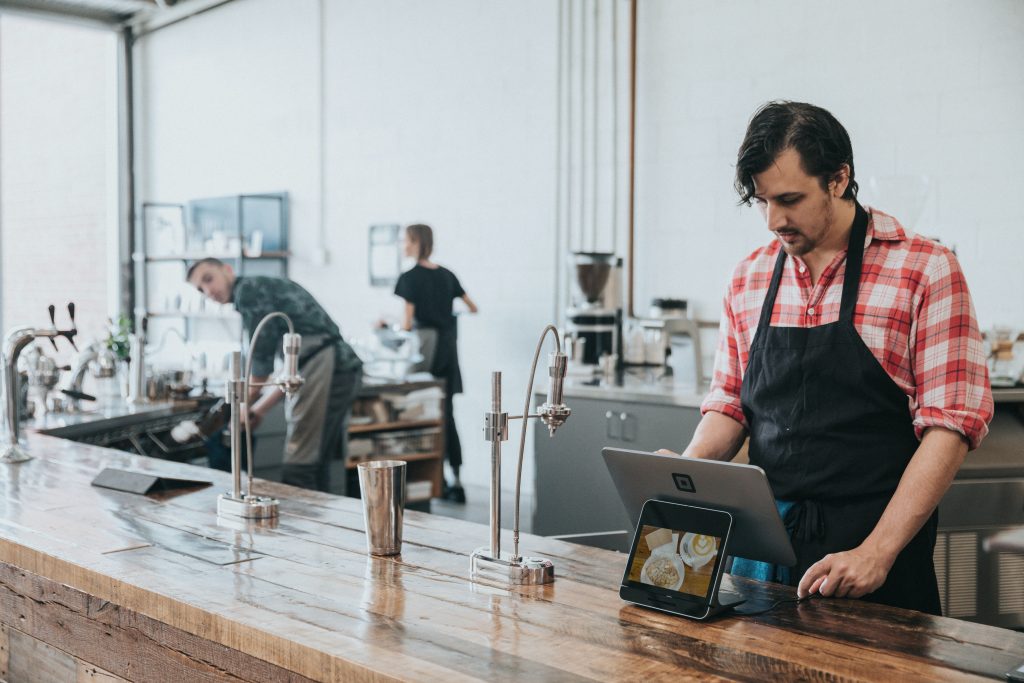Exciting news: Brizo FoodMetrics has been acquired by Datassential! Learn more.

From AI and kitchen robotics to tech-enabled HR and inventory management — to generating leads and closing deals — today’s restaurant technology trends are revolutionizing the foodservice industry. But a lot of time and effort typically go into evaluating and choosing the right tech solutions and providers.
Here are 8 tech advancements that are having the greatest impact on foodservice — if you’re selling to restaurants, these are the solutions that restaurant decision-makers need to know about.
Today, ordering restaurant supplies is simpler than ever. Kitchens can quickly and easily access a wide range of restaurant tech platforms designed to streamline order submission to suppliers. They can then get approximate delivery dates sent directly to their system. Through innovative AI enablement, these platforms can make suggestions based on a restaurant’s stock levels, all integrated with the establishment’s existing ordering systems for a simple, seamless experience.
The result is less friction, reduced waiting times, and increased client loyalty.
Asset tracking is essential to helping restaurants control costs by preventing the loss and theft of valuable utensils and appliances. The trick, however, is balancing the tracking with creating a great customer experience.
Geofencing is becoming a popular solution. As the name suggests, geofencing uses GPS trackers to ensure that all items remain on the premises.
In the same way that many restaurants process payments digitally through a point of sale (POS) system, they can now employ digital inventory management tools to help streamline operations and reduce labor costs.
These systems automate and speed up inventory management through features like auto alerting when stock is low, and order replication that eliminates redundant work effort. They also typically integrate into existing inventory systems, allowing for easy recurring orders and always-accurate deliveries.
Shared kitchens are becoming more common, especially in cities with high real estate costs. But increasingly, technology is the essential ingredient to making shared kitchens work. Automation is critical in a business model that depends on tightly scheduled time slots for cooking many different meals. Kitchen sharing platforms can automate these processes, allowing for accurately slotted bookings, and updating the kitchen calendar in real time.
Accepting payments. Connecting with suppliers. Organizing food delivery. Accessing the POS. Connecting with waitstaff. Managing online reviews.
These are just a few of the many tasks in restaurant management that mobile technology makes easier. According to one recent stat, almost 60% of all website traffic comes from mobile devices.
So make sure that the solutions you choose for your business have good mobile apps, because chances are you’ll be using them more than half the time you’re online.
More consumer choices and stiffer competition in the foodservice industry make customer relationship management more important than ever. A robust CRM system is a vital enabler. This type of restaurant industry technology works as a database that allows you to keep a record of your clients, their preferences, and contact details. It can help you track new prospects, follow up on leads, nurture relationships with decision-makers, and ultimately entice them to do more business with you.
Business intelligence (BI) is another area of the restaurant industry where technology is proving to be a game-changing tool.
Business intelligence tools give users deep, actionable insight into everything from where to locate new restaurants and emerging menu trends to the use of delivery apps and the online presence of your competitors. Besides assessing an entire market’s performance and getting the pulse of the industry, users can also apply this data to create more targeted products, stronger sales pitches, and better marketing campaigns..
One of the effects of Covid has been that restaurants have had to work harder than ever to win and keep customers. Enter marketing automation: simple, intuitive platforms for campaign development that let users create personalized, targeted emails and landing pages easily and cost-effectively.
These tools are designed for lead-generation and e-commerce, so that prospects can easily click through and contact a sales rep or purchase a product. They merge easily with existing customer lists, and have built-in reporting that tracks responses and overall campaign performance. They also ensure that users comply with relevant privacy legislation — for instance, through opt-ins that make certain marketers have clear consent. This is an important factor in marketing, given today’s greater concerns with privacy.
Technology is playing an ever more important role in helping restaurants automate labor-intensive processes, reduce error, and generally give customers the convenience they want, when they want, in the channel they want. It’s also helping food manufacturers and distributors target products and deliver what their customers truly need.
Brizo FoodMetrics can help professionals across the industry make sense of, and take action on, big-picture trends. Learn how to put our platform to work for your business — start your free trial today.